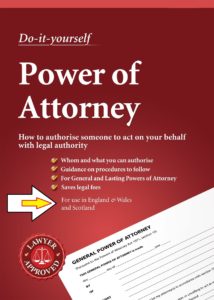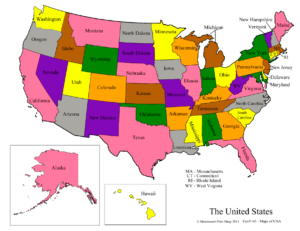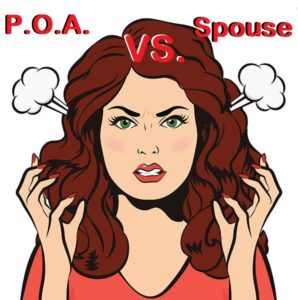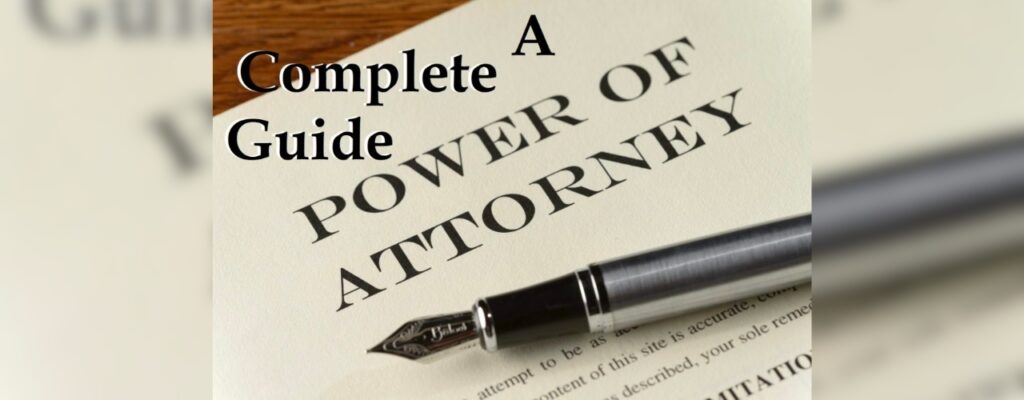Power of Attorney is the most common, and used of all documents prepared by lawyers. The Power of Attorney (“POA”) is also the most likely legal document to have errors, which make it invalid. This article seeks to answer your questions. It seeks to explain why things are done in a Power of Attorney the way they are done. It gives direction on how one may wish to act.
What Is the Authority For A Power Of Attorney?
Section 442.230 of the Revised Statutes of Missouri, mandates that a Power of Attorney is valid if the formalities set out by state law are adhered to. Those mandates are detailed in Chapter 442 of the Statutes of Missouri. These are the citations that one should quote when seeking to validate a Power of Attorney.
Should I Download A Power of Attorney Form from The Internet, or from An Office Supply Store?

Your Power of Attorney Must Strictly, 100% Adhere to Your Particular State’s Laws
The formalities to create a valid Power of Attorney are requirements, are not negotiable, and “almost” will not do. Power of Attorney formalities are set out, by law, state by state. These POA are usually mandated by state statute, rather than a regulation. Those POA formalities must be adhered to.
The Power of Attorney Requirements Change, Depending Upon Your Status
The problem with a Power of Attorney form from the internet is that one cannot tell whether those formalities are correct. The formalities may have been made for another state. The internet form POA formalities may be old and no longer valid. It is unlikely the internet form POA will take into account your status, and status matters. For example, the legal requirements to create a valid Power of Attorney differ when they are made for:
- a corporation with a seal,
- a corporation without a seal,
- a married person,
- a single person,
- a citizen,
- or otherwise.
If these status formalities do not match your particular status, the internet form Power of Attorney will not follow the law and the internet Power of Attorney form will not be valid.
The same problems occur with a store-bought Power of Attorney. The form itself may have been prepared by an attorney, or even a team of qualified attorneys. However, that store-bought Power of Attorney delegates to you, a non-lawyer, the work of deciding whether the document they created applies to you.
You May Need Something Different Than a Power of Attorney

What is more, you are considering buying a Power of Attorney to accomplish a certain task; you have a reason. Your reason may create other legal problems you do not anticipate.
Take an example from the medical community. Say a person has severe, persistent headaches. A pain-relieving medication may take each headache away. However, the underlying condition that caused the headache will persist. This could be a medical condition from a tooth cavity to brain cancer. A wise person would seek the advice of a physician for severe, persistent headaches. So, too, a wise person should seek the advice of an attorney for a long term, important document like a Power of Attorney.
A Power of Attorney form from the internet or an office supply store cannot anticipate what you will be using that Power of Attorney for. Therefore, it may not work for the job you intend. That is like putting a round peg through a square hole. Worse, Power of Attorney forms tend to be used only during or after an emergency. That is not the time when you wish to discover that your cheap form is invalid.
Is My Power of Attorney Valid in Another State?
The U.S. Constitution

The full faith and credit clause of the United States Constitution mandates a legal status, such as that granted by a Power of Attorney form, in one state must be recognized in another state. This authority is the United States Constitution, Article IV, Section I, which states that “full faith and credit shall be given in each state to the public acts, records, and judicial proceedings of every other state. And the Congress may by general laws prescribe the manner in which such acts, records, and proceedings shall be proved, and the effect thereof.” Thus, a valid Missouri Power of Attorney should be valid in Kansas.
Exceptions May Make an Out-Of-State Power of Attorney Invalid
There are exceptions to the general rule of universal acceptance of the Power of Attorney. First, if your residence has changed, then it is likely the Power of Attorney legal requirements in your new residence jurisdiction differ. In that case, you should get a new Power of Attorney. Your old Power of Attorney may or may not be valid as the new state’s Power of Attorney laws may be the same as your old resident state’s laws for Powers of Attorney. However, that presumption is speculative, and risky.
Second, if you completed a power of attorney that is valid in one state, say Kansas, but you at the time resided and intended to use it another state, say Missouri, then it is likely invalid.
A Practical Reason to Replace an Out-of-State Power of Attorney
Third, you intend to give a copy of your Power of Attorney to another person or entity when you use it, correct? While your Power of Attorney may be valid, that validity does not mean the person you give it (who is not the lawyer and has not researched the matter) will recognize your out-of-state Power of Attorney. The receiving party may incorrectly conclude that your POA is invalid because it was made in another state. You may later be proven correct and they be proven wrong. However, that would put you in the legal position of having to sue the receiving party to obtain a declaratory judgment from a court in that jurisdiction, declaring your Pout-of-state Power of Attorney form valid in your new state. You do not want to go to those lengths. It is easier, more effective, and less expensive to have a new Power of Attorney form drafted according to your new residence State.
What If the Spouse (Husband or Wife) Disagrees with The Decisions of the Person with the Power of Attorney?

The Power of Attorney is known as the “agent” or “attorney in fact.” They have the power to act on behalf of the person who signed the valid Power of Attorney document. However, that power does not extend over that person’s spouse. There are many types of decisions where either spouse has full authority to decide. For example, decisions made with respect to children can be made by either parent. It is unlikely a later court would validate the decision of a Power of Attorney for one parent over the actual other parent.
Another example of a conflict with respect to spouses is the transfer of real estate. If one person wishes to buy or sell land owned by a married couple, both spouses need to sign the deed. If an attorney in fact with the Power of Attorney form signs over real estate, and fails to include the spouse, that “agent creates a “cloud on title.” This means a later court may have to declare the status, value, rights, and obligations of the parties to clear up the title. A signature of both spouses is recommended, even if the real estate land deed only contains the name of one spouse.
With these types of exceptions in mind, it remains true that the “attorney in fact” is the agent of the person who signed over the Power of Attorney. He or she can make decisions, within the scope of the terms of the Power of Attorney, even if that person’s spouse disagrees with those decisions. There is no automatic spousal Power of Attorney veto.
What Is the Difference Between A General and Specific Power of Attorney?
Most people create general Power of Attorneys. These allow the agent or attorney-in-fact to transact any legal authority the original person would have. A specific Power of Attorney is limited, and grants only limited authority to the attorney in fact. Most limited, specific, Powers of Attorney limit authority to decisions involving:
- Medical treatment
- Children (like on field trips)
- A specific financial transaction
- A specific medical procedure
- Care for the elderly
It is especially important to use a lawyer when drafting a specific, limited, Power of Attorney. That lawyer will want to expressly tailor the document to your needs and not include authority beyond the scope of your needs.
What Is A “Durable” Power of Attorney?
The term “durable” in a Durable Power of Attorney does not mean it lasts forever. Rather, a Durable Power of Attorney means it gives authority to the attorney-in-fact or agent even if the person later becomes incapacitated. The attorney power, given during a time of capacity, endures into a time of incapacity.
Will My Power of Attorney Work If I Become Incapacitated?
Section 404.705.1 of the Revised Statutes of Missouri specifically indicates that a Durable Power of Attorney remains valid even if the person later becomes incapacitated. It is critical to use the specific language from the statute. Follow the link here to Missouri Revised Statute 404.705, and I suggest you copy and paste the language verbatim.
Can A Power Of Attorney Buy, or Sell Real Estate/Land/a House?
Section 404.705.1 (b) (3) indicates that if subscribed by the principal, dated, and acknowledged correctly, an Attorney-in-Fact can convey real estate. The power of a Power of Attorney form to buy or sell land or a house is further backed up by Statute 442.360 of the Revised Statutes of Missouri. That deals with the power to convey real estate as an agent or an attorney for the owner in the manner in which that is done. Statute 442.130 of the Revised Statutes of Missouri also comes into play when one is seeking to buy or sell real estate, land, or a house as a Power of Attorney. 442.130 sets out the needed formalities to convey that land or real estate. Follow the formalities. Do it as exactly according to the law. Powers of Attorney can then buy or sell real estate.
Does A Power of Attorney Need to be Filed or Recorded Somewhere?
A Power of Attorney does not need to be recorded or otherwise filed with a government office. Section 404.705.3 of the Revised Statutes of Missouri governs this. It provides that a Power of Attorney does not have to be recorded to be valid and binding between the principle and the attorney in fact, or between the principle and third persons.
There is an exception, however. A recording may be required for transactions affecting real estate under Section 442.360, or 442.370 of the Revised Statutes of Missouri. Remember to check these two statutes if you are using a Power of Attorney to transact real estate or sell a home.
What Happens to my Power of Attorney If I Die?
The Power of Attorney conveys the legal authority of one person and transfers it to another. A Durable Power of Attorney can transfer that authority even after the original person loses capacity. However, the Power of Attorney ceases to have validity and the attorney in fact has power to do nothing (under the POA) at the moment the conveying party dies. Your Power of Attorney dies with you.
Dominance – What Happens When Two Attorneys-In-Fact Disagree?
It is common for someone issuing a Power of Attorney to give it to more than one person. This happens when a parent gives a Power of Attorney to each of two or more children. This can happen where business partners give the power to transact business to more than one business partner. A parent can give a Power of Attorney to more than one teacher for a child’s field trip. What happens; then, when two attorneys-in-fact disagree as to what to do? Who has the authority?
The fact and the law of the matter is that both attorneys-in-fact have power, and conflicting decision … well … conflict. This is the same as two parents with equal power over their child wish for two different things. This is the same as two business partners with equal shares disagreeing about a business decision. Conflicting attorneys-in-fact have to work it out between themselves.
The Solution: Dominance should be written into the Power of Attorney to clarify who has the authority when disagreements occur. Dominance, unfortunately, is rarely written into Powers of Attorney. It is lucky; then, that disagreements between attorneys-in-fact are unusual. However, in my opinion, there is no reason for an attorney to draft a Power of Attorney to more than one person and not include a dominance provision unless the client specifically directs them not to. Dominance provisions clarify the roles of the parties. They reduce the likelihood of conflict. They resolve conflicts.
Why Are Two Signatures Needed for a Power of Attorney?
A Power of Attorney is not a valid document under the laws of many states of the United States, including Missouri, without two signatures, and a separate notary seal. Section 442.200 governs the transfer of real estate in Missouri. It indicates two signatures are needed when an attorney conveys the real estate transaction. Furthermore, Section 442.210 indicates that those two witnesses must also include their signature, their full name, and their places of residence to transact a valid real estate deed. Two signatures are needed for real estate. Remember; formalities matter with Powers of Attorney. Sign your name; spell your name, write out your place of residence, two witnesses.
Is a Notary Needed for A Power Of Attorney?

A notary seal and signature is a requirement for a Power of Attorney. Section 442.150 (1) of the Revised Statutes of Missouri, mandates a notary seal for any real estate transaction. Further, Section 442.210.1 indicates that the Power of Attorney must use specific language, which differs upon the status of the party signing the transaction. There is specific language for a person signing for themselves. There is specific language if you are signing through an attorney relationship. Corporations with seal are different than corporations without seal. A stock association must use specific language, which will differ than a corporation no corporate seal. Married couples are required to sign together also using specific language. If the formal, specific language of a Power of Attorney from Section 442.210 is not used, the transaction is invalid, and the Power of Attorney is without effect. Formality in compliance with the statute matters.
The Power of Attorney For your Children – Does A Power of Attorney Act Like a Guardianship?

A Power of Attorney is not a substitute for a guardianship. A guardianship is a legal status giving the guardian authority to act on behalf of an individual who may be a minor, or may be incompetent. That guardian can exercise authority, even if the individual who is the subject of the guardianship does not agree with their decision.
A Power of Attorney differs. The Power of Attorney does not have independent authority over the person granting it. A Power of Attorney can only give authority to an individual who is consenting to give that authority. A Power of Attorney is not a guardianship for a child.
Should I Use A Power of Attorney Form Provided By The Hospital?
The Power of Attorney form drafted by a lawyer should be generally accepted by institutions, such as hospitals and care facilities. However, occasionally, a particular institution may conclude a Power of Attorney does not meet its individual requirements. That institution may be flat wrong, and in violation of the law. However, to clear up the error, a lawsuit would have to be filed in court and a judge would have to enforce it.
I recommend humoring such mistaken beliefs, and using the form provided by the institution/entity/hospital if that is its requirement. There are practical reasons why this occurs. First, the institution may not have the legal staff to read and interpret each Power of Attorney it receives. Such institutions know what their own Power of Attorney form says. The hospital knows what its own power of attorney form does not say. Also, a hospital often provides a power of attorney form free of charge. Note: this is for purposes of a hospital. I would not advise anyone using a hospital power of attorney form for purposes outside of the hospital. It may be invalid for those reasons. It may put you in legal harm.
Is The Person (Agent or Attorney-In-Fact) Granted the Authority Obligated to Act as Power of Attorney?

A person is not required to abide by a Power of Attorney form even if one is granted. Section 404.705.4 of the Revised Statutes of Missouri clears up that there is no mandate to act as the attorney in fact or agent even if such powers are granted to you. The exception is if you sign a separate agreement binding yourself to act as an attorney in fact or act as a fiduciary.
How Do I Revoke my Power of Attorney?

Section 442.370 of the Revised Statutes of Missouri indicates there is no formality to revoke a Power of Attorney. I recommend that if you do revoke your Power of Attorney, that you communicate to the attorney in fact or agent in a manner that can later be verified. I also recommend getting back possession of the original and any copies of the Power of Attorney, just to be safe. If you are concerned about a particular kind of transaction, notify that institution. In short, no formality is required to revoke a Power of Attorney.
Even though a Power of Attorney may be revoked by the individual giving it, that does not mean it will necessarily, no longer be effective or used. For example, if you revoke your Power of Attorney, but the former attorney-in-fact still goes forward and uses the apparent revoked authority, a third party such as a bank, hospital, or other individual may not know about the revocation and may honor the power, in spite of it being previously revoked.
What Are the Duties of The Attorney in Fact or Agent as A Power of Attorney?
The attorney in fact or agent does not necessarily have to be a fiduciary with a special relationship to act on their behalf. The exception is if they are in a jurisdiction covered by the Uniform Power of Attorney Act or if they sign a separate agreement to act as a fiduciary. Missouri is not an example of those jurisdictions. Kansas is not a Uniform Power of Attorney Act state either. Thus, there is no obligation to act on the person’s behalf.
Why Do Lawyers Charge More for A Power of Attorney?

Specific Tailoring: One can see from the paragraphs above, there are many formalities to create a valid Power of Attorney. An attorney from the jurisdiction in which you wish to use it will draft a Power of Attorney that works under the law of that jurisdiction. That takes expertise and experience. An attorney will also draft a Power of Attorney that is up to date with the law as it stands, when signed. An attorney can also draft a Power of Attorney that is valid in multiple jurisdictions and states. An attorney can draft a specific Power of Attorney document that does exactly what the client intends it to do. A form from the internet, from a hospital, or from an office supply store, will be a general form, and may not be effective for what the client needs. Furthermore, the lawyer can specifically target the Power of Attorney form so that it does not do what the client does not want it to do.
Legal Advice: The most important aspect of an attorney drafting a Power of Attorney document on behalf of a client (costing more than a free or low-cost form) is the legal advice. The attorney can discover what your legal concerns and needs are. They can make sure the document drafted meets your needs. Moreover, it may be that you have other concerns, or other problems you are not anticipating. An attorney should be able to see those future problems, and give advice to solve them.
For example, you may need specific kind of deed for a real estate transaction you do not yet anticipate. You may need a separate contract for a business transaction for which you intend to use the Power of Attorney. A Power of Attorney for a child may need additional legal steps from a court to be valid. There may be Last Will and Testament issues. There may be a medical directive need. A Trust may need to be set up. When you hire an attorney to draft your Power of Attorney, you are also paying for the additional time, and the quality of service you receive. That is why people pay more for a Power of Attorney drafted by a lawyer. Overall, in my experience, it is one of the very best values one can get for attorney time.
Power of Attorney Tips
I suggest making sure on a Power of Attorney document that the signature page has writing from the heart of the document on it. You want some of the Power of Attorney terms to spill over onto the signature page. You do not want to draft a document were your signature is followed by a notary and two witnesses without being able to link it to the particular document. That page could be transferred to a different contract and used against you. That is also why I recommend page numbers on the bottom that also indicate the total number of pages, such as “Page 2 of 7.”
Next, I suggest you spread out the Power of Attorney, and take a photograph with it, digitally. Then, email yourself the photo of the full Power of Attorney document and save it to your smartphone or digital device. This way, you always have the Power of Attorney, fully signed, notarized, and witnessed, available to you in electronic format should you ever need it. Remember, the Power of Attorney is typically not used when someone anticipates a problem. A problem occurs. The need arises. The Power of Attorney form becomes necessary. It is best to have it available, at the ready, ahead of time.



